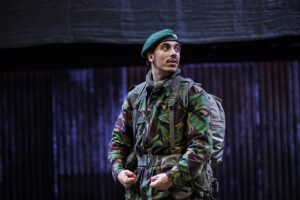Jessica Harris watches the RSC tackling a modern war story.
An ambitious piece, Falkland Sound is based on a trip by playwright, Brad Birch, to this small archipelago in the Southern Atlantic. His first-hand experience has done much to ensure that the play conveys both people and place.
With shades of Under Milk Wood, the production tells the stories of residents of the Falkland Islands (Islas Malvinas), from their lives before the Falklands conflict of 1982 to their experiences of the conflict itself. Islanders describe themselves as both farmers and ‘two-nighters’ – parties held on farmsteads when work is done. Dependent on each other, and with a strong sense of community, they are also astute and self-aware: “Gossip is a form of exercise,” says one. It is the scenes of Islanders’ lives that work best in this production.
Meanwhile, in Britain, Margaret Thatcher faces re-election. Politicians and press stoke up jingoistic sentiments to support her chances. With characters played as stereotypes, these scenes feel heavy-handed at times, although digital projections of Thatcher giving speeches enable a deeper dive into the political climate of the times.

Whilst the influence of British politics on events in the Falklands is conveyed through multiple characters, the effect of Argentine politics is revealed through one character alone. Sebastian, an Argentinian military officer, is left to portray a parallel jingoism within the Argentinian state, the incompetence and brutality of its bureaucracy, and the day-to-day experiences of troops and conscripts on the ground.
This is a tall ask, and the production feels imbalanced as a result. In some instances, stories of individuals are overlong, especially in the second act. Many of the tales have a rising tension, but not given space for this tension to fall away. Added to this, much of the narration is declamatory in style. As a result, overall dramatic impact is reduced.
Now and again, moments with potential for dramatic effect fall flat. The destruction of Mrs. Hargreaves’ house, with the implied death of the old lady inside, concludes only with the character walking off stage. Whilst she carries her house symbolically with her, no other effects or characterisation are used to express this tragedy.
Similarly, the depiction of the sinking of the Argentine battleship, the Belgrano, as it was sailing away from the Falklands, leading to the death of over 330 people, is under-dramatised. Despite the production making extensive use of digital projection, this event is told through actors’ physicality alone, and its full horror not conveyed.
Ultimately, the play is insightful and thought-provoking, albeit something of a curate’s egg in its delivery. It is our shared experiences that connect us and give us a sense of belonging, rather than artificial sentiments conjured up by nationalistic forces.
Joanne Howarth gives a poignant performance of Mrs Hargreaves, and also doubles to create a powerful Thatcher, both digitally and on stage.
Falkland Sound was written by Brad Birch and directed by Aaron Parsons. It is on at the RSC until 16 September. Further information can be found at rsc.org.uk.
Pics – Ellie Kurttz (c) RSC.


